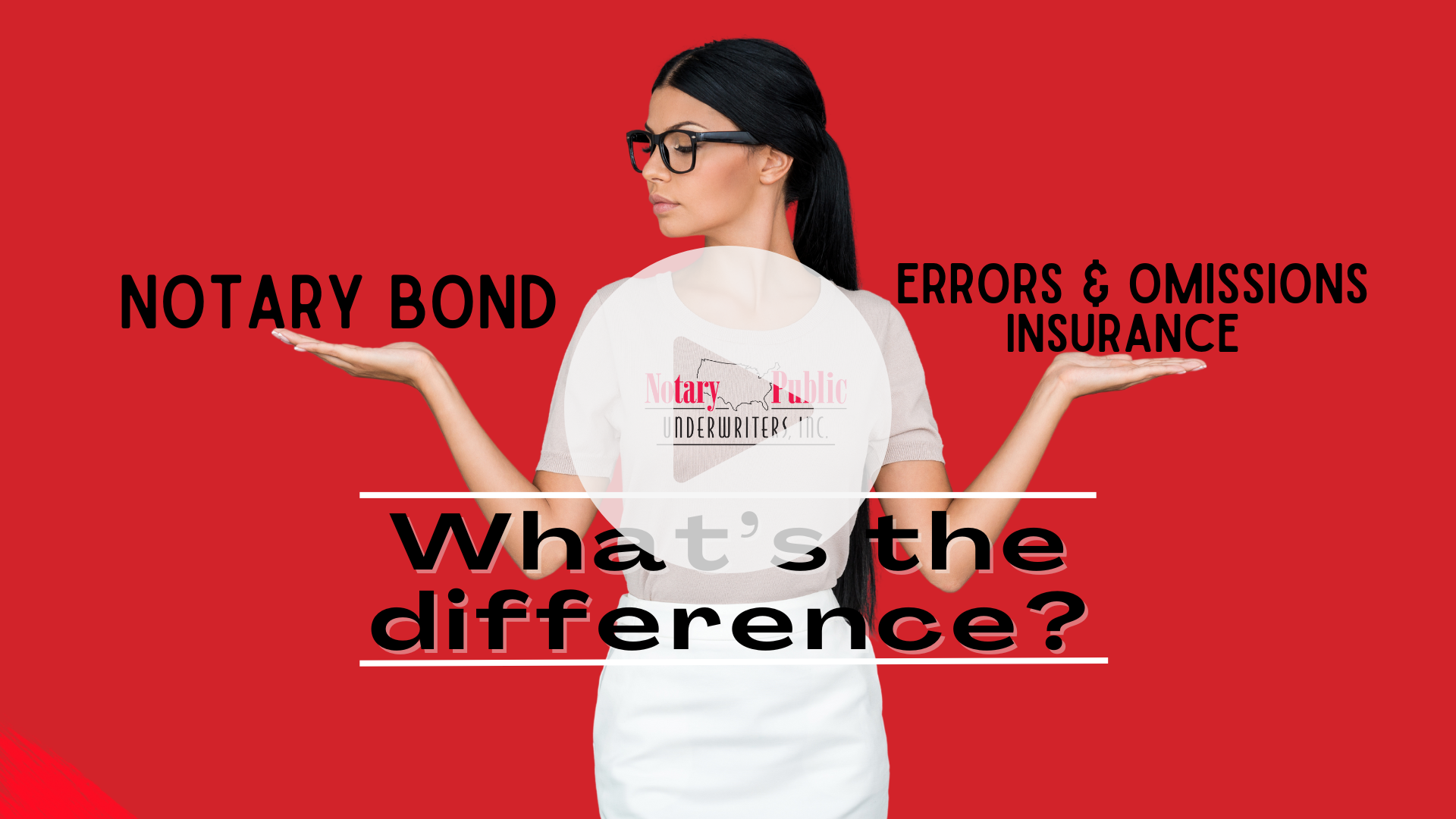Notary Public Underwriters Blog
Understanding the Difference Between the Notary Bond and Errors & Omissions Insurance
- Details
- Published: March 25, 2024

As a notary public, you play a crucial role in helping to deter fraud and promote the integrity of document transactions. However, the responsibilities of a notary come with inherent risks, including potential mistakes that could lead to legal consequences. To protect yourself, it's essential to understand the difference between a notary bond and errors & omissions (E&O) insurance and why having both is crucial.
Notary Bond
A notary bond is a type of surety bond that serves as a financial guarantee to your state government and the public. Essentially, it ensures that you will fulfill your duties as a notary public ethically and according to the law. If you fail to adhere to your obligations, individuals who suffer financial losses due to your misconduct can file a claim against your bond.
When you become a notary public, most states require you to obtain a notary bond as part of the licensing process. The bond amount varies by state but typically ranges from $5,000 to $50,000. However, it's crucial to note that a notary bond does not protect you as the notary; instead, it protects the public in case you make errors or engage in misconduct.
If a claim is made against your bond, the surety company will initiate an investigation into the allegations. This investigation may involve gathering evidence, interviewing relevant parties, and assessing the validity of the claim. If the surety company determines that the claim is legitimate and falls within the scope of the bond's coverage, they will compensate the claimant up to the bond's limit. You will be held responsible for repaying any amount the surety pays to satisfy the claim.
Errors & Omissions (E&O) Insurance
Errors & omissions (E&O) insurance, on the other hand, is a form of professional liability insurance that is designed to protect notaries against claims alleging negligence, errors, or omissions in their services. Unlike a notary bond, E&O insurance directly safeguards the notary public, providing financial protection in the event of a claim or lawsuit.
E&O insurance for notaries typically covers legal defense costs, settlements, judgments, and other expenses associated with claims arising from mistakes or oversights in notarial acts. These errors could include failing to properly identify signers, incorrect notarization procedures, or unintentional omissions in document completion.
Without E&O insurance, notaries risk shouldering the financial burden of legal defense costs and potential settlements or judgments out of pocket in the event of a claim. E&O insurance provides financial security and peace of mind by covering these expenses.
Why Notaries Need Both
Now, you might be wondering, if a notary already has a notary bond, why would they need E&O insurance?
While a notary bond primarily serves the interests of the public by guaranteeing financial compensation for aggrieved parties, it does not protect the notary. Remember, if a notary makes an unintentional error in a document or overlooks a crucial detail, resulting in financial harm to a client, a claim may be made against the notary bond, and if the claim is valid, the notary will be held responsible for reimbursement.
This is where E&O insurance becomes indispensable. E&O insurance safeguards your personal assets. Without this coverage, you could be putting your savings, property, and other assets at risk.
How Much Insurance is Enough?
Before selecting an E&O insurance policy, assess your risks and exposures. Factors such as the types of documents you notarize and the likelihood of errors or disputes should be taken into account.
As a general guideline, if you assess your risk level as low, obtaining an E&O policy with a minimum coverage amount equivalent to your notary bond is recommended. However, for notaries handling high-value transactions or documents with legal implications, opting for higher coverage levels is advisable to effectively mitigate potential financial losses. If your risk level falls in the middle, consider choosing a coverage amount that aligns with your risk assessment.
If you have any questions, please contact our Customer Care Team. We are happy to help!
Related Article(s)
Declining a Notarization: A Guide to Handling a Delicate Situation With Professionalism
What Do I Do With My Record Book (Journal) Entry When a Notarization Is Cancelled (Not Completed)?
Notary and Signing Agent Insurance - What Are They and Do I Need Them?
Beyond the Notary Stamp – Supplies Notaries Need
What to Do When the Notary Certificate Is Missing?
How to Handle Out-Of-State Documents
Tips to Protect Your Notary Stamp and Journal

